If your dog used to sleep with you, but now wants to sleep alone all of a sudden, you might be wondering why. It’s natural to feel a bit sad about it. There could be different reasons for your dog’s behavior.
Maybe your dog isn’t feeling well physically or emotionally, and that’s why they want to be alone. They could be anxious or sick. Or it might just be a preference for them to have their own space.
In this blog post, we will explore the possible reasons why does my dog like to sleep alone and some tips that help your dog when they want to sleep alone.
Why Does My Dog Like To Sleep Alone? (8 Reasons)
Dogs, like humans, have individual preferences and personalities, which can influence their behaviors, including their sleeping preferences. There could be several reasons why do dogs like to sleep alone.

1. Temperature and Comfort
Dogs have their own ideal comfort zones when it comes to temperature and sleeping conditions. If your dog prefers a cooler or warmer sleeping environment than what you provide, they might seek out a different spot to sleep where they feel more comfortable.
2. Safety and Security
Some dogs are naturally more independent and may feel safer when they have their own space. This might be especially true for dogs that have had negative experiences with other animals or humans in the past.
3. Territorial Instincts
Dogs are territorial animals, and some dogs might prefer to have their own space where they can feel in control and secure. Dog sleeping alone can allow them to establish their territory without potential competition from other dogs or pets.
4. Noise and Disturbances
Dogs have keen senses of hearing and can be easily disturbed by sounds during the night. If your dog is a light sleeper, they might prefer to sleep alone to avoid disturbances from other pets, household noises, or even your movements.
5. Personal Space
Another possible reason why does my dog like to sleep alone is due to personal space. Just like people, some dogs simply enjoy having their own personal space. This could be due to their unique personality traits and their need for some solitude and relaxation.
6. Health Issues
Sometimes, if a dog is not feeling well, it might prefer to be alone. Pain or discomfort could make them seek out a quieter and more isolated spot to rest.
7. Past Experiences
If your dog has had negative experiences sharing sleeping spaces with other dogs, they might develop a preference for sleeping alone. Traumatic experiences, such as fights or conflicts with other pets, could lead to this behavior.
8. Age and Maturity
Older dogs or those with a more mature disposition might prefer solitude as they age. Puppies are usually more social and seek out companionship, while older dogs might value their alone time more.
Pros & Cons of Dogs Sleeping With Their Owners
The decision whether to allow your dog to sleep in your bed depends on various factors and personal preferences. Here are some pros and cons to consider.
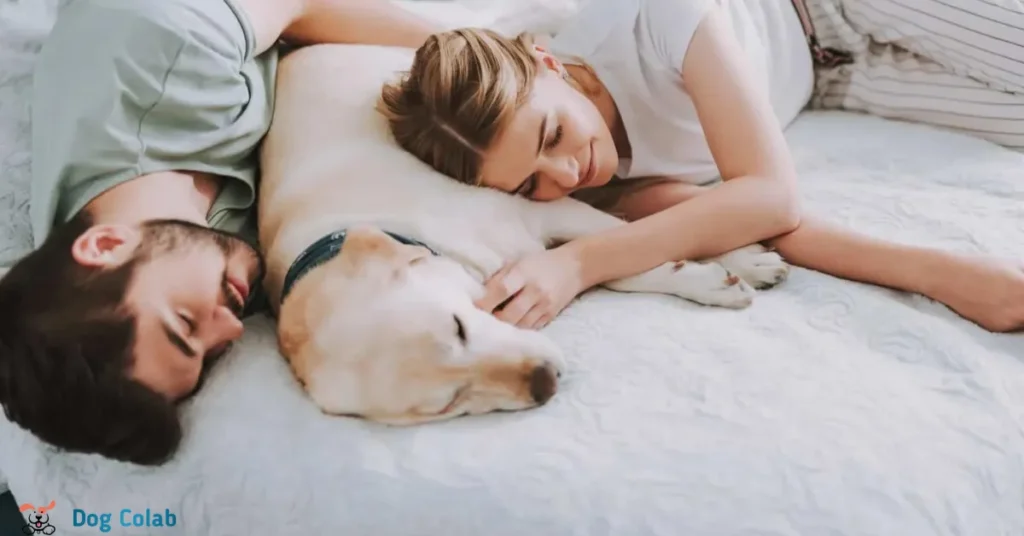
Pros
- Bonding: Sharing a bed with your dog can strengthen the bond between you two. Physical closeness during sleep can reinforce the emotional connection you share.
- Warmth and Comfort: Dogs are warm creatures, and their body heat can provide comfort during colder nights. Many people find the presence of a dog soothing and relaxing.
- Reduced Anxiety: Dogs are known to have calming effects on humans. Sleeping with your dog can reduce anxiety and stress, leading to better sleep quality for both you and your furry companion.
- Security: Some people feel safer with their dog in bed, as the dog’s presence can act as a deterrent to potential intruders.
- Regulation of Sleep Patterns: Dogs have a natural instinct to be active during the day and sleep at night. Sharing a bed can help regulate their sleep patterns and prevent disruptive behavior during nighttime.
Cons
- Sleep Disturbances: Dogs can be restless sleepers, causing disruptions in your sleep. They might move around, snore, or wake up during the night.
- Hygiene and Allergies: Dogs can carry dirt, allergens, and even parasites into the bed. This can pose problems for people with allergies or asthma.
- Dominance and Territory Issues: Allowing your dog to sleep in your bed might blur the lines of hierarchy in your household. Some dogs can become territorial or possessive over the bed, which could lead to behavioral issues.
- Interrupted Intimacy: For couples, having a dog in the bed can interfere with intimacy and alone time.
- Sleep Quality: While many people find comfort in sleeping with their pets, some studies suggest that sharing a bed with a pet can lead to poorer sleep quality due to the aforementioned disturbances.
- Health Concerns: There’s a small risk of transmitting zoonotic diseases (diseases that can spread between animals and humans) when sharing close sleeping quarters with your dog.
Do Dogs Prefer To Sleep Alone?
Whether dogs prefer to sleep alone or with their owners can vary depending on the individual dog’s personality and experiences. Some dogs might prefer to sleep alone, as it gives them their own space and quiet time. This can be especially true for more independent or shy dogs.
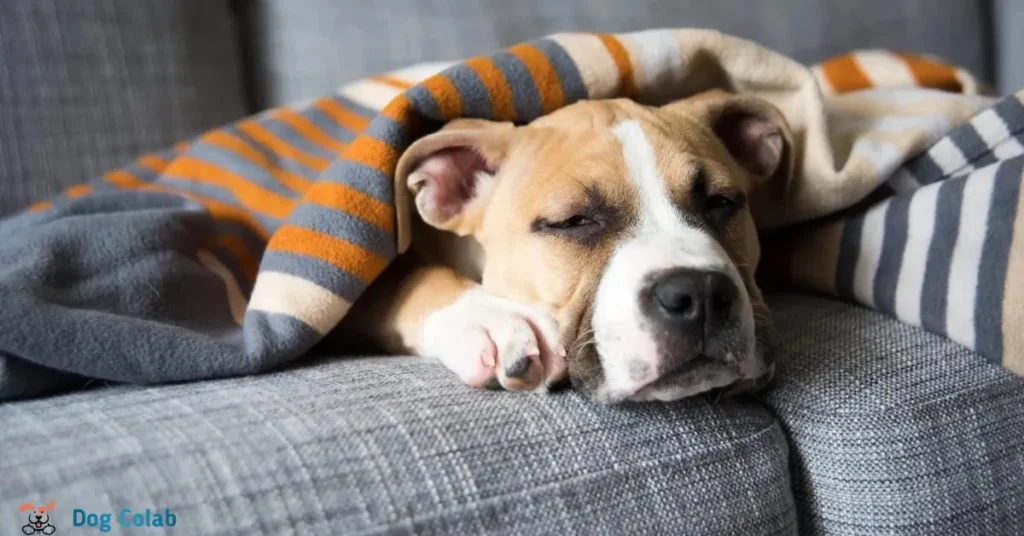
On the other hand, many dogs are social animals and enjoy the comfort and security of sleeping close to their human companions. Dogs are pack animals by nature, and sleeping near their pack (which includes their owners) can make them feel safe and connected.
Ultimately, it’s important to observe your dog’s behavior and preferences to determine whether they prefer to sleep alone or with you.
Recommended Also Read:- Why do dogs sleep on you at night.
Should I Be Worried if My Dog Wants To Sleep Alone?
If your dog wants to sleep alone, there’s usually no need to be worried. However, if your dog’s behavior suddenly changes and they start avoiding human contact or show signs of discomfort, it might be a good idea to keep an eye on them and consider consulting a veterinarian if the behavior continues. Otherwise, if your dog seems healthy and happy overall, it’s perfectly okay for them to choose their sleeping spot.
Why Does My Dog Leave My Bed In the Middle of the Night?
Your dog might leave your bed in the middle of the night for a few reasons. One common reason is that they might be too warm and want to find a more relaxed spot. Dogs have fur coats, so they can get hot easily.
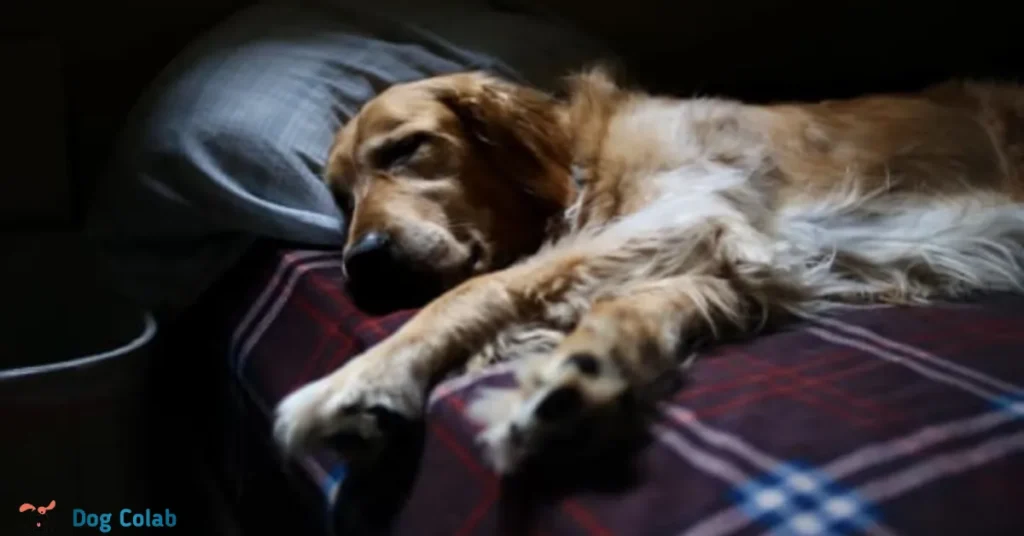
Another reason could be that they’re feeling restless or uncomfortable. They might need to stretch, change their position, or even go to the bathroom. Sometimes dogs have natural sleep cycles and might wake up briefly during the night.
Why Does My Dog Not Want To Sleep With Me All of a Sudden?
Dogs might suddenly not want to sleep with you due to various reasons. They could be feeling unwell or in pain, and being near you might make them uncomfortable.
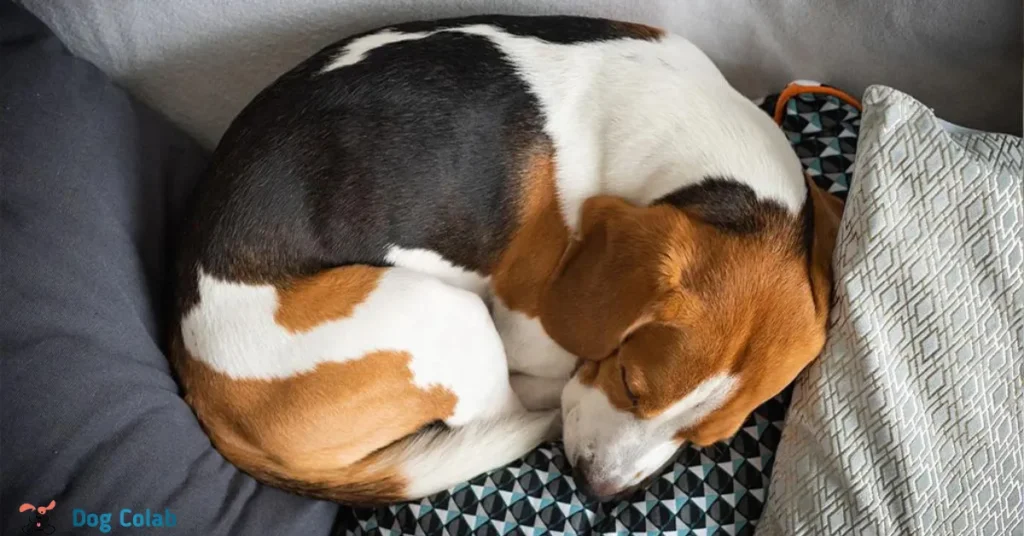
Changes in their routine, environment, or recent experiences could also be stressing them out. Behavioral changes, like sudden fear or anxiety, could also be causing this.
Read More:- Why are dogs light sleepers.
Is It Okay To Let Your Dog Sleep Alone?
Yes, it’s perfectly okay to let your dog sleep alone. Just like humans, dogs have individual preferences and comfort levels when it comes to sleeping arrangements. Some dogs might prefer their own space to rest and sleep peacefully. Providing a comfortable and cozy sleeping area for your dog can be a great option.

Make sure the space is quiet, safe, and away from any disturbances. Offering a soft bed, some familiar toys, and perhaps an item of your clothing with your scent can help your dog feel secure.
How Do You Make A Good Dog Sleeping Area?
Creating a comfortable and suitable sleeping area for your dog is essential to ensure they get a good night’s rest. Here’s what makes a good sleeping area for a dog.
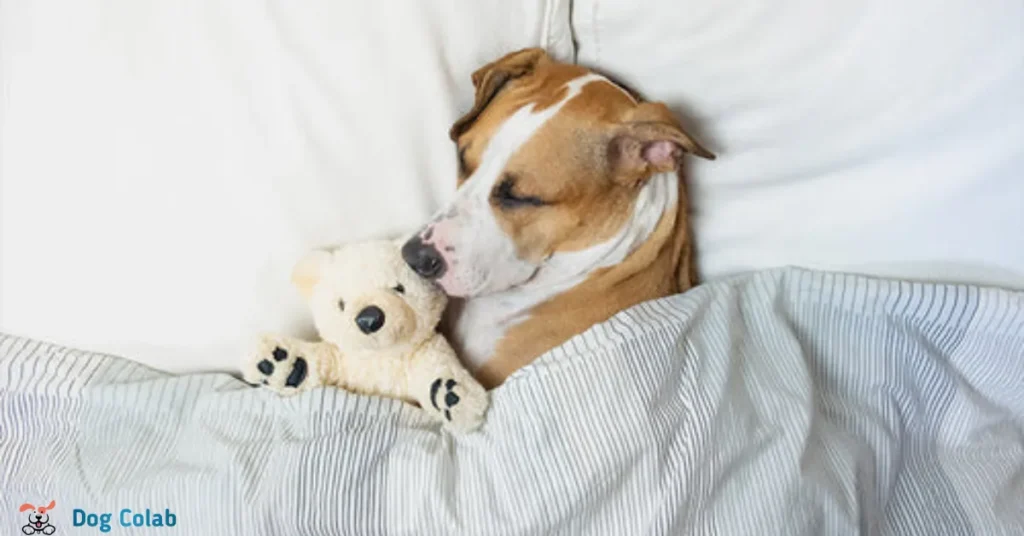
- Comfortable Bed: Choose a bed that provides adequate support and cushioning for your dog’s body. There are various types of beds available, including memory foam, orthopedic, and padded beds. Consider your dog’s size, age, and any special needs when selecting a bed.
- Appropriate Size: The bed should be appropriately sized for your dog. In order to feel comfortable, they should be able to stretch out without feeling cramped. If your dog likes to curl up, a slightly smaller bed might be suitable.
- Location: Place the bed in a quiet and calm area of your home, away from high-traffic areas and noise. This gives your dog a sense of security and minimizes disturbances during sleep.
- Temperature Consideration: Make sure the sleeping area is at a comfortable temperature for your dog. Avoid placing the bed in drafty or overly hot areas. If your dog is sensitive to temperature changes, consider using blankets or adjusting the location accordingly.
- Cleanliness: Keep the sleeping area clean and free of dirt, debris, and odors. Regularly wash your dog’s bed cover or bedding to maintain hygiene.
- Coziness: Some dogs enjoy the feeling of being enclosed. If your dog likes this, consider a bed with raised sides or a cozy doghouse-style bed.
- Familiar Items: Place familiar items near the bed, such as their favorite toys or a piece of your clothing that carries your scent. This can provide comfort and familiarity.
- Quiet Environment: Dogs, like humans, need a peaceful environment to sleep well. Minimize loud noises and disturbances during their sleeping hours.
- Accessibility: Ensure that the sleeping area is easily accessible for your dog, especially if they’re older or have mobility issues. Consider the height of the bed and any potential obstacles.
- Consider Special Needs: Some dogs might have specific needs due to age, health conditions, or breed characteristics. For example, senior dogs might benefit from orthopedic beds, while smaller breeds might prefer beds with steps or ramps for easy access.
How To Help My Dog When They Want To Sleep Alone?
If your dog suddenly wants to sleep alone and you want to support their preference, here are some steps you can take to ensure they have a comfortable and safe sleeping experience.
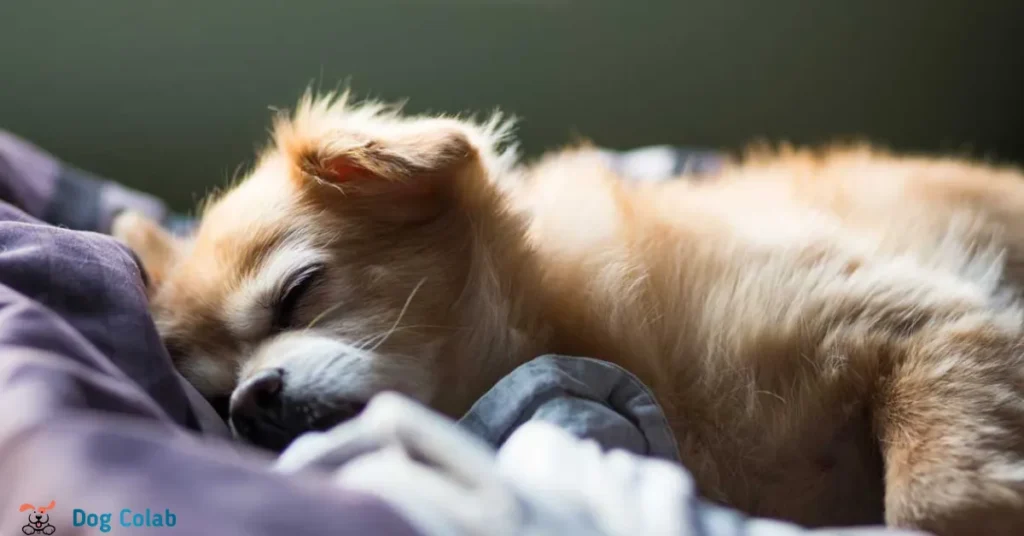
- Provide a Cozy Sleeping Area: Set up a designated sleeping area that is comfortable and inviting. Place a soft and supportive bed in a quiet, low-traffic part of your home. Consider adding blankets or bedding materials your dog enjoys.
- Choose a Comfortable Bed: Select a bed that suits your dog’s size and sleeping style. Some dogs prefer beds with raised sides or enclosed spaces, while others like flat, open beds. Ensure the bed is well-padded to provide proper support.
- Make the Space Appealing: Add some of your dog’s favorite toys, a piece of your clothing with your scent, or items they associate with comfort. This can help make the area more inviting.
- Positive Reinforcement: Encourage your dog to explore and use their new sleeping area. Reward them with treats, praise, or gentle pets when they show interest in the space or use it for sleeping.
- Respect Their Space: Once your dog starts sleeping alone, respect their choice. Avoid trying to coax them into your bed or making them feel guilty for choosing their own space.
- Create a Relaxing Routine: Establish a calming bedtime routine that signals to your dog that it’s time to sleep. This could include a short walk, quiet playtime, or some gentle petting before bedtime.
- Check for Discomfort: Ensure your dog isn’t avoiding your bed due to underlying health issues. If they seem unusually lethargic or reluctant to move, consult your veterinarian.
- Monitor Behavior: Keep an eye on your dog’s behavior to ensure they’re comfortable in their new sleeping area. If they continue to show signs of wanting to sleep alone, it’s important to respect their choice.
- Offer Reassurance: If your dog is anxious or hesitant about sleeping alone, spend some extra quality time with them during the day. Engage in activities they enjoy and provide reassurance that you’re still there for them.
- Consult a Professional: If your dog’s sudden desire to sleep alone is accompanied by other unusual behaviors or changes in appetite, it might be wise to consult a veterinarian or a professional dog behaviorist to rule out any underlying issues.
Recommended Also Read:- Why does my dog ignore me sometimes.
Conclusion “Why Does My Dog Like To Sleep Alone”
To wrap up, if your dog starts wanting to sleep alone all of a sudden or likes to sleep alone, it’s crucial to find out why. Sometimes, they might feel scared or nervous. Other times, changes around them or health problems could be causing it.
If you notice this happening, it’s a good idea to take your dog to the vet for a check-up to make sure they’re okay. Also, try to figure out if anything has changed in their surroundings and make their sleeping spot cozy and safe. This can help your dog feel better and less worried.
NOTE:- More information can be found by clicking this link.
FAQs
1. Why does my dog prefer to sleep away from me?
Dogs may sleep away from you to feel safe and secure. Facing away helps them monitor the room while avoiding direct eye contact. It’s a sign of trust and a desire for undisturbed rest.
2. Where do dogs feel most comfortable?
Dogs’ comfort varies; some prefer crates by your bed, others like living room blankets. The choice depends on age, personality, health, and your preferences.
3. Where is the best place for a dog to sleep?
The ideal spot for your dog to sleep is on a dedicated dog bed. You can enhance their comfort based on their preferences. Providing a personal bed ensures better rest for your pup, catering to their needs and ensuring a cozy sleep.
4. How do I know if my dog is depressed?
Signs of dog depression include reduced appetite, disinterest in once-loved activities, destructive chewing, clinginess, withdrawal, irritability, and increased accidents. If these persist, consult a vet for proper evaluation and guidance.

